人教版高二英语知识点必修一:考点三turn
- 格式:docx
- 大小:16.55 KB
- 文档页数:3
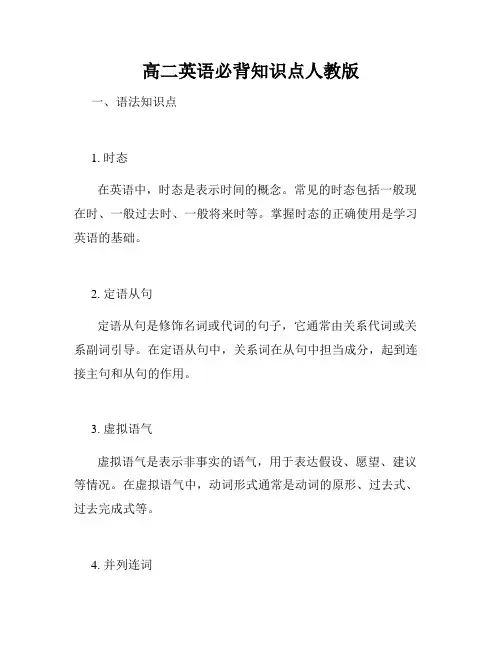
高二英语必背知识点人教版一、语法知识点1. 时态在英语中,时态是表示时间的概念。
常见的时态包括一般现在时、一般过去时、一般将来时等。
掌握时态的正确使用是学习英语的基础。
2. 定语从句定语从句是修饰名词或代词的句子,它通常由关系代词或关系副词引导。
在定语从句中,关系词在从句中担当成分,起到连接主句和从句的作用。
3. 虚拟语气虚拟语气是表示非事实的语气,用于表达假设、愿望、建议等情况。
在虚拟语气中,动词形式通常是动词的原形、过去式、过去完成式等。
4. 并列连词并列连词是连接两个独立的句子或词组的重要工具。
常见的并列连词有and、but、or等,它们能够起到连接作用,并且可以使句子结构更加丰富多样。
5. 介词和介词短语介词是一种辅助词,常用来表示方位、时间、原因等关系。
介词短语由介词和其它成分组成,可以在句子中起到修饰名词或代词的作用。
6. 被动语态被动语态是表示动作的承受者是谓语动词的一种语态。
被动语态的构成是由助动词be加上过去分词形成,它常用于强调动作的承受者,或者主语无法确定的情况。
二、词汇知识点1. 同义词同义词是指意义相近的词语,它们之间的差别主要在于用法、感情色彩等方面。
学习同义词可以丰富词汇量,提高语言表达的准确性。
2. 反义词反义词是指意义相反的词语,它们之间的对比可以帮助理解词语的意义。
熟练掌握反义词可以提高语言的灵活运用能力。
3. 词根和词缀词根是构成单词的基本单位,一般表示词语的核心意义。
词缀是附加在词根上的一个字母或字母组合,用以改变词根的意义或词性。
学习词根和词缀可以帮助记忆和理解各种词语。
4. 时态相关词汇时态相关词汇是指与时态紧密相关的词汇,包括动词的不同形式、时间状语等。
掌握时态相关词汇可以帮助准确表达过去、现在和将来的事实、习惯和计划等。
5. 常用短语和习惯用语常用短语和习惯用语是日常英语中经常出现的固定搭配,学好这些短语和用法可以提高听说能力,使语言更加地道和流利。

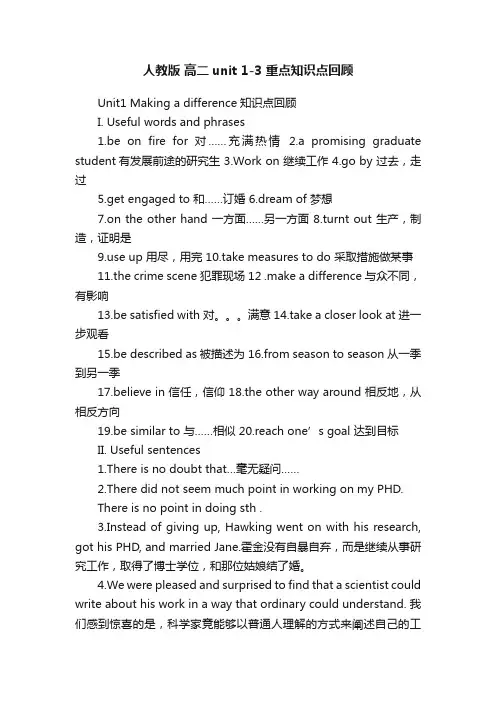
人教版高二unit 1-3 重点知识点回顾Unit1 Making a difference知识点回顾I. Useful words and phrases1.be on fire for 对……充满热情2.a promising graduate student有发展前途的研究生3.Work on 继续工作4.go by 过去,走过5.get engaged to 和……订婚6.dream of 梦想7.on the other hand 一方面……另一方面 8.turnt out 生产,制造,证明是e up 用尽,用完 10.take measures to do 采取措施做某事11.the crime scene 犯罪现场 12 .make a difference 与众不同,有影响13.be satisfied with 对。
满意 14.take a closer look at 进一步观看15.be described as被描述为 16.from season to season 从一季到另一季17.believe in 信任,信仰 18.the other way around 相反地,从相反方向19.be similar to 与……相似20.reach one’s goal 达到目标II. Useful sentences1.There is no doubt that…毫无疑问……2.There did not seem much point in working on my PHD.There is no point in doing sth .3.Instead of giving up, Hawking went on with his research, got his PHD, and married Jane.霍金没有自暴自弃,而是继续从事研究工作,取得了博士学位,和那位姑娘结了婚。
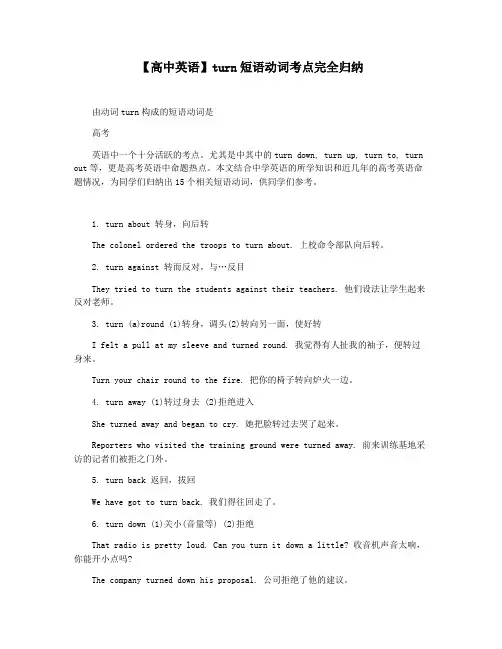
【高中英语】turn短语动词考点完全归纳由动词turn构成的短语动词是高考英语中一个十分活跃的考点。
尤其是中其中的turn down, turn up, turn to, turn out等,更是高考英语中命题热点。
本文结合中学英语的所学知识和近几年的高考英语命题情况,为同学们归纳出15个相关短语动词,供同学们参考。
1. turn about 转身,向后转The colonel ordered the troops to turn about. 上校命令部队向后转。
2. turn against 转而反对,与…反目They tried to turn the students against their teachers. 他们设法让学生起来反对老师。
3. turn (a)round (1)转身,调头(2)转向另一面,使好转I felt a pull at my sleeve and turned round. 我觉得有人扯我的袖子,便转过身来。
Turn your chair round to the fire. 把你的椅子转向炉火一边。
4. turn away (1)转过身去 (2)拒绝进入She turned away and began to cry. 她把脸转过去哭了起来。
Reporters who visited the training ground were turned away. 前来训练基地采访的记者们被拒之门外。
5. turn back 返回,拔回We have got to turn back. 我们得往回走了。
6. turn down (1)关小(音量等) (2)拒绝That radio is pretty loud. Can you turn it down a little? 收音机声音太响,你能开小点吗?The company turned down his proposal. 公司拒绝了他的建议。
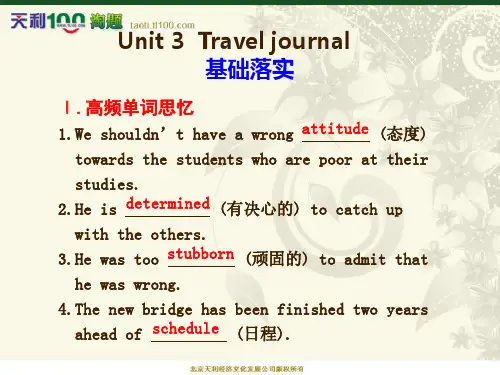
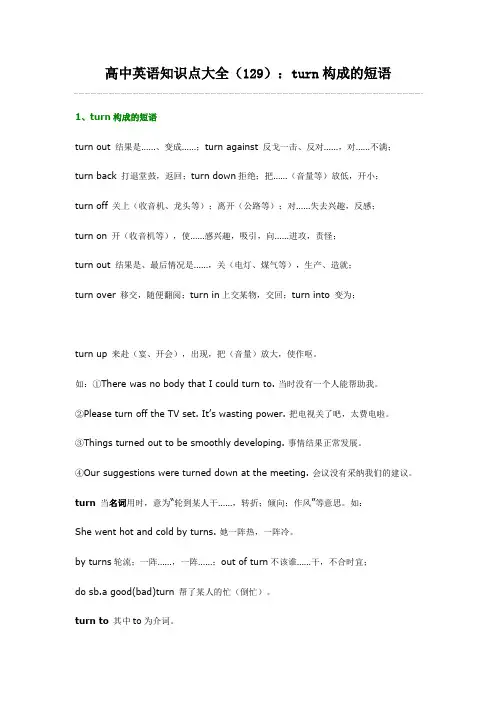
高中英语知识点大全(129):turn构成的短语1、turn构成的短语turn out 结果是……、变成……;turn against 反戈一击、反对……,对……不满;turn back 打退堂鼓,返回;turn down拒绝;把……(音量等)放低,开小;turn off 关上(收音机、龙头等);离开(公路等);对……失去兴趣,反感;turn on 开(收音机等),使……感兴趣,吸引,向……进攻,责怪;turn out 结果是、最后情况是……,关(电灯、煤气等),生产、造就;turn over 移交,随便翻阅;turn in上交某物,交回;turn into 变为;turn up 来赴(宴、开会),出现,把(音量)放大,使作呕。
如:①There was no body that I could turn to. 当时没有一个人能帮助我。
②Please turn off the TV set. It’s wasting power.把电视关了吧,太费电啦。
③Things turned out to be smoothly developing. 事情结果正常发展。
④Our suggestions were turned down at the meeting. 会议没有采纳我们的建议。
turn 当名词用时,意为“轮到某人干……,转折;倾向;作风”等意思。
如:She went hot and cold by turns. 她一阵热,一阵冷。
by turns轮流;一阵……,一阵……;out of turn不该谁……干,不合时宜;do sb.a good(bad)turn 帮了某人的忙(倒忙)。
turn to 其中to为介词。
(1)转向He turned to me and said hello to me. 他转向我向我问好。
(2)查阅;求助于If you are in trouble,please turn to me. 如果你有麻烦,请找我。
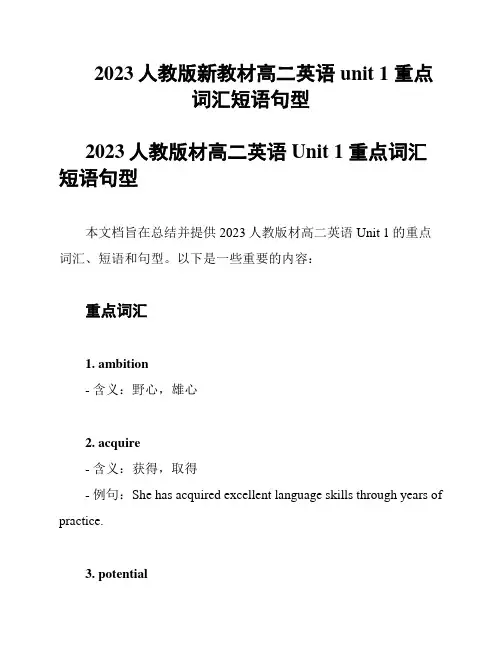
2023人教版新教材高二英语unit 1 重点词汇短语句型2023人教版材高二英语Unit 1 重点词汇短语句型本文档旨在总结并提供2023人教版材高二英语Unit 1的重点词汇、短语和句型。
以下是一些重要的内容:重点词汇1. ambition- 含义:野心,雄心2. acquire- 含义:获得,取得- 例句:She has acquired excellent language skills through years of practice.3. potential- 含义:潜力,可能性4. challenge- 含义:挑战5. diverse- 含义:多样的,各种各样的- 例句:Our school has a diverse student population from different countries.重点短语1. set a goal- 含义:设定目标- 例句:In order to succeed, you need to set clear goals.2. work towards- 含义:为...努力3. take pride in- 含义:以...为傲- 例句:She takes pride in her achievements in the field of science.4. make progress- 含义:取得进步- 例句:With dedicated practice, you will make progress in your language skills.5. face challenges- 含义:面对挑战重点句型1. It takes determination and hard work to achieve success.- 含义:要取得成功需要决心和努力。
- 例句:It takes determination and hard work to achieve success in any field.2. Don't be afraid of failure; it is part of the learning process.- 含义:不要害怕失败,它是研究过程的一部分。
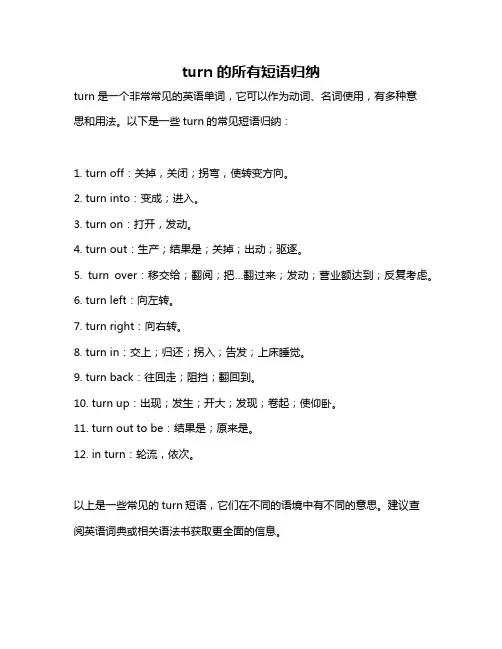
turn的所有短语归纳
turn是一个非常常见的英语单词,它可以作为动词、名词使用,有多种意
思和用法。
以下是一些turn的常见短语归纳:
1. turn off:关掉,关闭;拐弯,使转变方向。
2. turn into:变成;进入。
3. turn on:打开,发动。
4. turn out:生产;结果是;关掉;出动;驱逐。
5. turn over:移交给;翻阅;把…翻过来;发动;营业额达到;反复考虑。
6. turn left:向左转。
7. turn right:向右转。
8. turn in:交上;归还;拐入;告发;上床睡觉。
9. turn back:往回走;阻挡;翻回到。
10. turn up:出现;发生;开大;发现;卷起;使仰卧。
11. turn out to be:结果是;原来是。
12. in turn:轮流,依次。
以上是一些常见的turn短语,它们在不同的语境中有不同的意思。
建议查
阅英语词典或相关语法书获取更全面的信息。
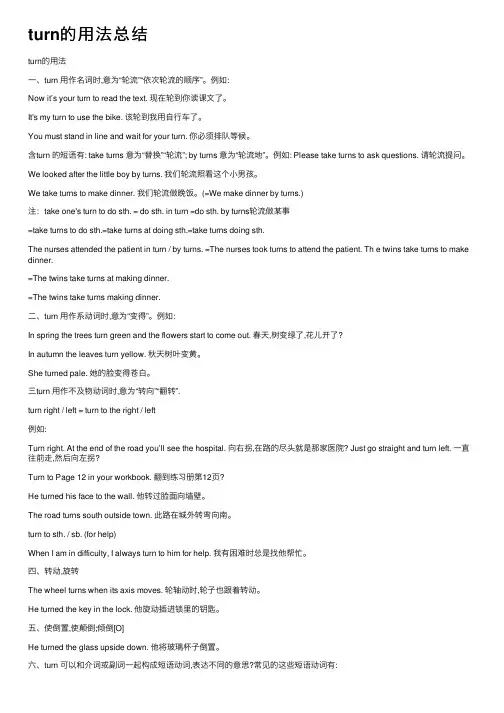
turn的⽤法总结turn的⽤法⼀、turn ⽤作名词时,意为“轮流”“依次轮流的顺序”。
例如:Now it’s your turn to read the text. 现在轮到你读课⽂了。
It's my turn to use the bike. 该轮到我⽤⾃⾏车了。
You must stand in line and wait for your turn. 你必须排队等候。
含turn 的短语有: take turns 意为“替换”“轮流”; by turns 意为“轮流地”。
例如: Please take turns to ask questions. 请轮流提问。
We looked after the little boy by turns. 我们轮流照看这个⼩男孩。
We take turns to make dinner. 我们轮流做晚饭。
(=We make dinner by turns.)注:take one's turn to do sth. = do sth. in turn =do sth. by turns轮流做某事=take turns to do sth.=take turns at doing sth.=take turns doing sth.The nurses attended the patient in turn / by turns. =The nurses took turns to attend the patient. Th e twins take turns to make dinner.=The twins take turns at making dinner.=The twins take turns making dinner.⼆、turn ⽤作系动词时,意为“变得”。
例如:In spring the trees turn green and the flowers start to come out. 春天,树变绿了,花⼉开了?In autumn the leaves turn yellow. 秋天树叶变黄。
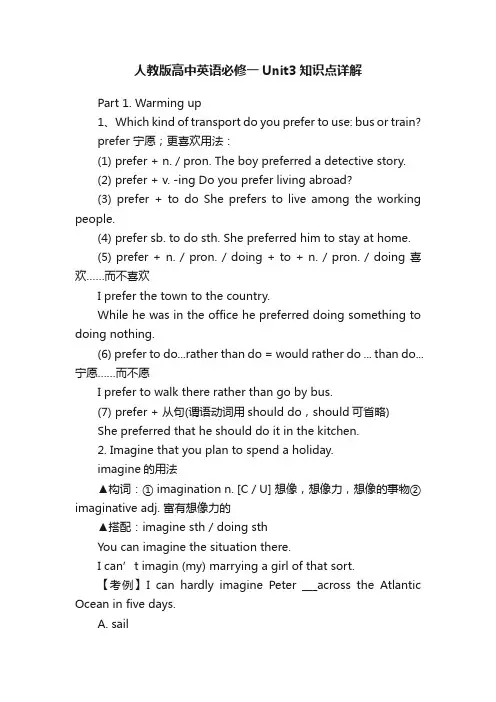
人教版高中英语必修一Unit3知识点详解Part 1. Warming up1、Which kind of transport do you prefer to use: bus or train?prefer 宁愿;更喜欢用法:(1) prefer + n. / pron. The boy preferred a detective story.(2) prefer + v. -ing Do you prefer living abroad?(3) prefer + to do She prefers to live among the working people.(4) prefer sb. to do sth. She preferred him to stay at home.(5) prefer + n. / pron. / doing + to + n. / pron. / doing 喜欢……而不喜欢I prefer the town to the country.While he was in the office he preferred doing something to doing nothing.(6) prefer to do...rather than do = would rather do ... than do... 宁愿……而不愿I prefer to walk there rather than go by bus.(7) prefer + 从句(谓语动词用should do,should可省略)She preferred that he should do it in the kitchen.2. Imagine that you plan to spend a holiday.imagine的用法▲构词:① imagination n. [C / U] 想像,想像力,想像的事物② imaginative adj. 富有想像力的▲搭配:imagine sth / doing sthYou can imagine the situation there.I can’t imagin (my) marrying a girl of that sort.【考例】I can hardly imagine Peter ___across the Atlantic Ocean in five days.A. sailB. to sailC. sailingD. to have sailed[答案与解析] C imagine后接动词的-ing形式,本句的Peter是这个动名词的逻辑主语。
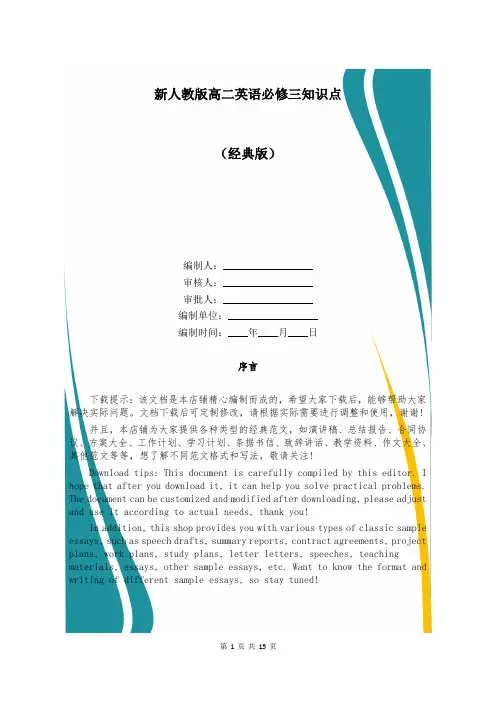
新人教版高二英语必修三知识点(经典版)编制人:__________________审核人:__________________审批人:__________________编制单位:__________________编制时间:____年____月____日序言下载提示:该文档是本店铺精心编制而成的,希望大家下载后,能够帮助大家解决实际问题。
文档下载后可定制修改,请根据实际需要进行调整和使用,谢谢!并且,本店铺为大家提供各种类型的经典范文,如演讲稿、总结报告、合同协议、方案大全、工作计划、学习计划、条据书信、致辞讲话、教学资料、作文大全、其他范文等等,想了解不同范文格式和写法,敬请关注!Download tips: This document is carefully compiled by this editor. I hope that after you download it, it can help you solve practical problems. The document can be customized and modified after downloading, please adjust and use it according to actual needs, thank you!In addition, this shop provides you with various types of classic sample essays, such as speech drafts, summary reports, contract agreements, project plans, work plans, study plans, letter letters, speeches, teaching materials, essays, other sample essays, etc. Want to know the format and writing of different sample essays, so stay tuned!新人教版高二英语必修三知识点英语上的学习是就好像是一场比赛,就好比是一场是没有尽头的马拉松比赛,你得不断地进行跑步,才能到更远的地方,所以学习英语要有积极正确的态度。
人教版高二英语知识点必修一:考点三turn【导语】高二一年,能人将浮出水面,鸟人将沉入海底。
高二重点解决三个问题:一,吃透课本;二,找寻合适自己的学习方法;三,总结自己考试技能,形成习惯。
为了帮助你的学习更上一层楼,作者高二频道为你准备了《人教版高二英语知识点必修一:考点三turn》期望可以帮到你!【考点3】与turn有关的短语① turn out 生产;结果是② turn down 关小(灯光、音量等);谢绝③ turn to 转向;求助于④ turn up 开大(灯光、音量等);显现,露面⑤ turn on / off 打开/关上⑥ turn aside 让开;放在一边⑦ turn over (使)翻转;把某人交给(警方等)⑧ turn in 上缴;移交⑨ turn against 背叛⑩ turn away (from) 转过脸不看⑩ turn round 转过去[例句]She turned out six full-length novels in her life.她一生写了6部长篇小说。
The beggar turned out (to be) a thief. 那个乞丐本来是个贼。
That radio is pretty loud. Can you turn it down a little?收音机声音太大,你能开小一点吗?Many boys expressed their love to Mary, but sheturned them all down. 许多男孩向玛丽表达喜欢之意,但都被她谢绝了。
After he left the university he became a teacher, but later he turned to translation. 他大学毕业后当了教师,但后来转而从事翻译工作。
We often turn to this handbook for information. 我们常常查阅这本手册寻觅资料。
高二英语人教版知识点高二英语人教版是一套非常有参考价值的教材,在学习过程中,我们需要掌握其中的各个知识点。
下面是高二英语人教版课程中的一些重要知识点。
一、语法知识点1. 时态:- 一般现在时:表示经常、习惯性的动作;- 现在进行时:表示现阶段正在进行的动作;- 一般过去时:表示过去某个时间发生的动作或存在的状态;- 过去进行时:表示过去某一时间段正在进行的动作;- 现在完成时:表示过去发生的动作对现在造成的影响或结果;- 过去完成时:表示过去某个时间点或动作之前发生的动作。
2. 名词性从句:- 主语从句:作为主句的主语;- 宾语从句:作为主句的宾语;- 表语从句:作为主句的表语;- 同位语从句:解释或说明主句中某个名词的具体内容。
3. 定语从句:- 关系代词引导:that, which, who, whom, whose;- 关系副词引导:when, where, why。
4. 状语从句:- 时间状语从句:表示时间关系的从句;- 地点状语从句:表示地点关系的从句;- 原因状语从句:表示原因或理由的从句;- 条件状语从句:表示条件或前提的从句;- 目的状语从句:表示目的或意图的从句;- 结果状语从句:表示结果或后果的从句。
5. 虚拟语气:- 表示与事实相反的虚拟语气:与现在事实相反,用一般过去时;与过去事实相反,用过去完成时;- 表示与未来事实相反的虚拟语气:用过去时的虚拟形式。
二、词汇知识点1. 同义词与近义词的辨析;2. 词组搭配与搭配习惯;3. 各类短语的用法与意义;4. 常用词汇的拼写与发音。
三、阅读知识点1. 阅读理解技巧:快速浏览、细节查找、主旨归纳等;2. 阅读技巧与思维导图的应用;3. 阅读中的生词处理与推测词义。
四、写作知识点1. 作文结构与段落分析;2. 写作常用句式与表达方式;3. 时态与语态的运用;4. 衔接词的使用。
五、听力知识点1. 听力技巧与听取关键信息;2. 听力材料中的生词处理与推测词义。
英语turn语法一、turn作动词的用法1. turn (使)转动;(使)旋转例如:The earth turns on its axis once every 24 hours.地球每24小时绕地轴自转一周。
2. turn(使)转向;(使)转身例如:Turn left at the traffic lights.在红绿灯处向左拐。
3. turn 翻动(书页);(使)翻转;(使)翻身例如:Please turn to Page 10.请翻到第10页。
4. turn=become (使)变得;(使)成为例如:The weather has suddenly turned cold.天气突然变凉了。
5. turn 旋动,拧动(操纵装置);例如:Turn off the light.关灯。
二、turn作名词的用法1. (依次轮到的)机会,一个班次It's your turn. 轮到你了。
2. 转向,转弯When you see the library on the left, make a right turn.当你看到左边的图书馆,然后向右转。
三、有关turn的短语1)turn up出现;开大(音量)I thought he would turn up sooner or later.我心想他早晚总会来的。
Turn the heat up.把暖气开大点。
2)turn out结果是it turn out, however , that some differences both between and within groups are quite marked .然而,它也可能证明:两个种群之间和种群内部的一些差异是相当明显的。
3)turn on打开;发动The last person who leaves the office needs to lock all the doors and turn on the alarm .最后一个离开办公室的人要把所有的门锁上,并启动报警装置4)turn off关掉;关闭Turn off any outside gas lines .关闭所有暴露在外的煤气管道。
高中英语知识点总结必修3重点短语 turn up turn up出席(某活动)(常用于口语);出现;找到;把(收音机等的)音量调大一些(其反义短语是turn down);到场
I’m sure your watch will turn up one of these days.
我担保你的手表准有一天能找到。
We invited her to dinner but she didn t even bother to turn up.我们请她吃饭她都不露面。
I can t hear the radio very well; could you turn it up a bit?
我听不太清楚收音机,你把声音调大点行吗?联想拓展
turn against 反对;背叛
turn down (音量等)调小;拒绝
turn off 关掉
turn on 打开;发动
turn out 结果是……;证明是……
turn to sb. for help 向某人求助
turn away 走开;转过脸去;把……打发走
turn in 进入;交出;上交
turn over 打翻;移交;反复考虑
turn into把……变成……
高手过招
(1)单项填空
He promised to come yesterday,but he hasn’t yet.turned in B. turned upturned on D. turned。
高考重要考点turn构成的重要短语turn作为动词和名词构成众多的短语,今天挑一部分最常考最重要的进行讲解。
turn用作动词时:1.turn down①调低(音量等),调小(反义词turn up)I wonder if you could turn down your radio a bit. 不知你能否把收音机的声音调小一点。
②拒绝(同义词refuse)When I applied to join the expedition, Shackleton turned me down because he thought I was too young and wasn’t qualified. 当我申请加入探险队时,沙克尔顿拒绝了我,因为他认为我太年轻,不够格。
(新人教版选择性必修3)2.turn up①调大(音量),开大(反义词turn down)Would you please turn up the TV? 请你把电视声音开大一点好吗?②出现,露面He promised that he would come, but he hasn’t turned up yet. 他答应要来的,但到现在还没有出现。
(2012陕西卷)3.turn in上交(同义词hand in)Turn in/Hand in all your homework when you return from vacation. 你假期回来后把所有的家庭作业都交上来。
4.turn on打开(煤气,水,电灯,电脑等)(反义词turn off)Please help me turn on the light. 请帮我打开灯。
5.turn off关闭(煤气,水,电灯,电脑等)(反义词turn on)Turn off the computer when you leave. 离开的时候把电脑关掉。
6.turn out①证明是,结果是,原来是It turned out tha t his brother died of a heart attack. 原来他哥哥死于心脏病发作。
(完整word版)turn的用法归纳如下,推荐文档turn的用法归纳如下:I. turn (n.) 顺序, 轮流1. It's one's turn to do sth. 轮到某人做某事It's your turn to make a decision.2. take one's turn to do sth. = do sth. in turn =do sth. by turns 轮流做某事The nurses attended the patient in turn / by turns. =The nurses took turns to attend the patient.turn (vi.) 转动,转向,翻转turn right / left = turn to the right / leftturn to sth. / sb. (for help)turn to page 84turn (link-v.) 变得……turn green / yellow 变绿/黄了Ten years later,he turnedteacher.A. /B. aC. anD. the注:此题考查turn 作连系动词的特殊用法,即turn 作连系动词时后接表语名词,省略冠词.所以此题的答案为A. 如果turn 后加into 则须在名词前加冠词a.固定词组:1. turn against 背叛Nobody will turn against his country.2. turn down 关小/ 拒绝He turned down my suggestion without hesitation.Please turn down the gas.3. turn from side to side 把身体转来转去The naughty boy turned from side to side while answering questions in class.4. turn in 上交The child picked up a purse on the way and turned it in to the policeman.5. turn ... into ... (使……)成为……The farmers are turning waste land into rice fields.6. turn off 关(水源、煤气、电灯等) / 避开(问题等)Turn off the light when you leave the room.7. turn on 打开(水、煤气、电灯、无线电等) / 对……发怒turn on the radioturn the gun on sb.8. turn out 结果是/ 证明是/ 生产出The weather yesterday turned out (to be) fine.The factory turned out more products than they had expected.9. turn over (使)打翻/ 翻身/ 翻动/ 翻耕(土地) / 转危为安The man turned over and went to sleep again when the telephone rang.10. turn up 开大/ 出现/ 找到/ 证明是(= turn out to be)The meeting is beginning,but he has not turned up. He might have been lost.turn用作名词时可以和不少介词构成介词短语,使用时须注意各短语意义上的细微差别。